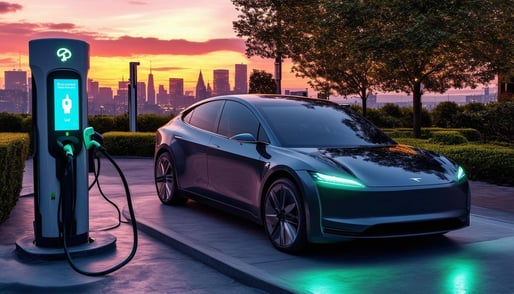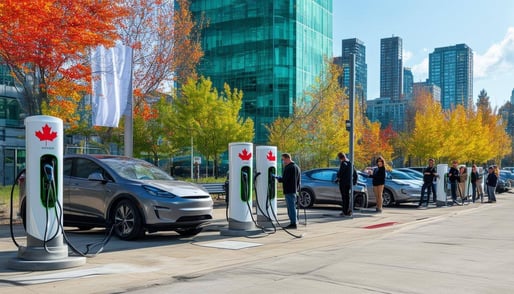As Canadian drivers continue to embrace electric vehicles (EVs), one question often arises: How does the cost of fuelling an EV stack up against a traditional gasoline-powered car? Across the country, the answer is increasingly clear. From coast to coast, drivers are discovering substantial savings by charging their EVs instead of filling up at the pump. In this article, we’ll break down the data, compare real-life trip scenarios, and highlight the significant long-term advantages of electrifying your ride—backed by reputable Canadian sources and current price estimates.
Why EVs Are More Affordable to Fuel
It’s no secret that electricity in Canada is generally cheaper and less volatile in price compared to gasoline. According to a Clean Energy Canada report, Canadian EV drivers effectively pay the equivalent of just $0.40 per litre to power their vehicles—significantly lower than the national average gasoline price (1).
Cost Comparison: Real-Life Examples
To bring these savings into perspective, consider the following trip cost comparisons (1):
- Montreal to Toronto:
- EV: $17
- Gas Car: $70
- Vancouver to Kelowna:
- EV: $10
- Gas Car: $57
- Edmonton to Calgary:
- EV: $17
- Gas Car: $32
These examples underscore that whether you’re crossing provincial borders or taking a weekend road trip, EVs can dramatically cut your travel expenses.
Long-Term Savings Add Up
The financial advantages of choosing an EV don’t end with daily commutes and occasional road trips. Over a 10-year ownership period, considering purchase price, fuel, and maintenance costs, Canadian EV drivers can save around $30,000—or roughly $3,000 per year—compared to a similar gas-powered vehicle (1).
.jpg?width=5000&height=3105&name=vecteezy_fuel-prices-displayed-on-a-signpost-in-a-rural-area-during_48913665%20(1).jpg)
Regional Variations in Charging Costs
Charging costs can vary depending on where you live in Canada. Here’s what you can expect (2):
- British Columbia: BC Hydro’s standard fast-charging rate (25 kW+) is approximately $0.3479 per kWh.
- Quebec: The Electric Circuit network charges between $12.77/h to $25.52/h at 50-kW fast chargers.
- Home Charging Across Canada: Home charging costs can be as low as $300 per year, making overnight plug-ins a highly economical option (2).
These rates can fluctuate based on regional electricity prices, membership plans, and the charging station type. Always check with local providers to confirm current rates.
Gasoline Price Benchmarks
For context, Canadian gasoline prices remain much higher. As of August 2024, the average gasoline price was 156.7 cents per litre, with some provinces and territories experiencing even higher rates (3). This persistent volatility in gasoline pricing stands in stark contrast to the relatively stable and lower-cost structure of electricity in Canada.

Visualizing the Savings
One of the most compelling ways to see EV savings is to translate charging costs into a “per-litre” equivalent:
- Toronto: About $0.32 per litre-equivalent for EV charging at home (4).
- Vancouver, Regina, and Winnipeg: Approximately $0.25 per litre-equivalent (4).
- Montreal: The lowest cost at just $0.18 per litre-equivalent (4).
These figures show that no matter where you live, you’ll pay significantly less per litre-equivalent than at a traditional gas pump.
Additional Considerations and Resources
Beyond fuel costs, EVs also benefit from lower maintenance expenses due to fewer moving parts, no need for oil changes, and reduced wear on brakes. With government incentives, rebates, and tax credits available in many provinces, the initial cost of purchasing an EV can be reduced, making the shift to electric even more compelling.
For more detailed information on EV charging costs, incentives, and infrastructure, consider the following sources:
- Clean Energy Canada: https://cleanenergycanada.org
- BC Hydro: https://www.bchydro.com
- Electric Circuit (Quebec): https://lecircuitelectrique.com
- Natural Resources Canada: https://www.nrcan.gc.ca
Conclusion: A Clear Advantage
As the numbers show, fuelling your vehicle with electricity can lead to substantial savings—both in daily driving and over the long haul. With charging infrastructure expanding, government incentives in place, and the cost of gasoline showing no signs of stabilizing at lower rates, now is the perfect time for Canadian drivers to consider making the switch to an electric vehicle. The financial advantages are hard to ignore, and the benefits only increase over time.
Sources:
(1) Clean Energy Canada, “The True Cost of Owning an Electric Vehicle” – https://cleanenergycanada.org
(2) BC Hydro & Electric Circuit Rates (2024 data) – https://bchydro.com, https://lecircuitelectrique.com
(3) Natural Resources Canada, “Fuel Prices” – https://www.nrcan.gc.ca
(4) Clean Energy Canada, regional EV charging cost comparisons – https://cleanenergycanada.org
Tags:
How much does EV charging cost?, EV Charging, Cost to charge an electric vehicle, SustainabilityDec 9, 2024 7:52:56 PM



Comments